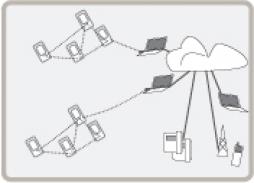MobileActive friend and colleague Anders Carlius runs Terranet, an innovative company providing mobile peer-to-peer technology. Anders is a former businessman from Sweden who decided he wanted to do good in the world with a new venture after a career in telecommunications. His company is after an emerging market in developing countries with either a rural or densely populated market (such as a refugee camp, for exaple).
The technology is simple: Terranet outfits a special Erricson phone with peer-to-peer wireless networking ability. In its pure form, there is no need for base stations, antenna installations or infrastructure. With this phone, a user can call and text anyone at no cost within two kilometers, or up to 20 kilometres in a mesh network. Through TerraNet wireless Internet access point, the phone turns into a normal wireless communication device.
From Terranet's prospectus:
The basic difference towards traditional mobile technology is that each TerraNet phone instantly communicates directly with other phones within a range of up to 1000 meters, without any base station. Calls can be made free between the phones, and all phones act as nodes and carry traffic between other phones in the cluster. Calls could also be directed to the outside world through a gateway connected to the Internet.
The handsets then collectively create a peer to peer cluster, while still maintaining the option to connect through traditional operator networks and thus enabling long distance calls, VoIP and other services.
The benefits generated by the TerraNet technology in comparison with traditional technologies are for example:
• Lower device cost
• Lower development cost
• Lower power consumption
• Ease of operations & maintenance
Terranet is rolling out a pilot in Ecuador with a local subsidiary, and is experimenting on several UK college campuses with the technology. In conversations with MobileActive, he stressed the significance of the technology in densely populated clusters, particularly refugee camps, where Terranet phones could be used by relief and camp workers.
Handset manufacturers who have sting interests in emerging markets such as Nokia and Motorola who have introduced low-cost handsets but not without the overhead associated with operating through the carrier networks exclusively. Since many handset manufacturers have their business interests tied to the carriers, they may not have an interest in making Terranet technology avalable on their handsets as ubiquitously as Blootooth, for example.
For more information, see also the recent article in the BBC.


Post new comment